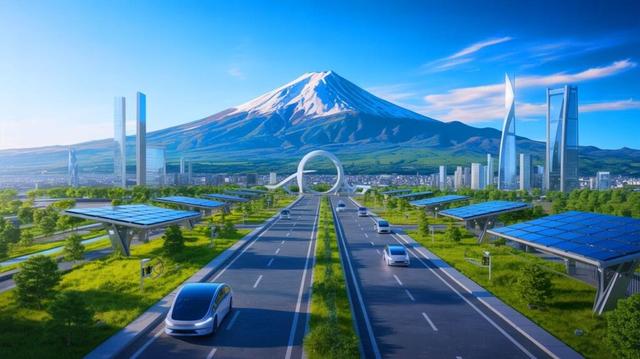https://www.alojapan.com/1297438/robot-city-under-mount-fuji-japan-set-to-unveil-worlds-first-fully-automated-underground-metropolis-by-2025/ “Robot City Under Mount Fuji”: Japan Set to Unveil World’s First Fully Automated Underground Metropolis by 2025 #AutonomousSystems #MountFuji #MountFujiNews #MountFuji #news #SustainableConstruction #UrbanInnovation #富士山 IN A NUTSHELL 🌆 Woven City is an experimental metropolis by Toyota at the base of Mount Fuji, set to launch in 2025. 🚗 The city features autonomous vehicles like the e-Palette and dedicated lanes for pedestrians and mobility…
#SustainableConstruction
Yesterday was flying bridge day at Bluefactory / EPFL Fribourg campus. This footbridge was built from saw-cut concrete blocks reclaimed from a demolished building wall, as a research prototype by EPFL's Structural Exploration Lab (SXL) lead by @fivet . Now it becomes part of the campus park.
#reuse #circularConstruction #sustainableConstruction #recrete
🌿 Travel Diary from Nepal – Part III: “Polluted City and Verdant Countryside”
Carolina Nilsson is in Nepal with Build Up Nepal, working on more sustainable building methods. From haze-filled Kathmandu to lush lowlands, she shares her experience with air quality, lab tests, site visits, and vibrant local life.
Read more: https://www.ewb-swe.org/stories
#EWBSE #BuildUpNepal #SustainableConstruction #TravelDiary #EngineeringForChange
What if concrete didn’t have to be grey, boring, and heavy? In 2025, that idea is being completely reimagined. #3Dprinting #ArchitecturalInnovation #ArchitecturalNews #modernarchitecture #Modernconcretedesign #Modulararchitecture #SustainableConstruction
We’re not building one house. We’re building a system. Robotic, rapid, zero waste.
#BuildSystems #ZeroWasteHousing #CamhirstMethod #RoboticHomes #SustainableConstruction
The impact of Global Warming due to deforestation
taoism environmentalismDeforestation is a world of great concern due to its negative impacts on the environment and, in particular, in Global Warming. As forests are destroyed and the vegetation cover is lost, a large amount of carbon dioxide (CO2) is released to the atmosphere, which contributes to climate change. In this article, we will explore in depth how deforestation affects Global Warming and what measures are being taken to address this urgent problem.
Direct impact of deforestation in Global Warming
Deforestation is responsible for approximately 10% of Global CO2 emissions. As?
Trees are known for their ability to absorb carbon dioxide through photosynthesis, a process in which CO2 convert into oxygen and glucose. When the forests massively cut, this natural cycle is interrupted and a massive carbon release stored in trees biomass is triggered.
In addition, deforestation also affects the water cycle. The trees play a key role in the regulation of rain patterns and water retention. When the forests are talked, the capacity of the ecosystems to retain water is reduced, which leads to drought in some areas and to catastrophic floods in others. These climatic extremes are also related to Global Warming and their impacts on human health and biodiversity.
Deforestation in different regions of the world
Deforestation occurs in various regions of the world and its effects on Global Warming can vary according to the particular characteristics of each area. Next, we will analyze how deforestation is affecting some key regions and how these challenges are being addressed.
Amazon
The Amazon is one of the areas most affected by deforestation. Illegal logging, the expansion of agriculture and mining are some of the main causes of forest loss in this region. As trees are talked, large amounts of CO2 are released, which contributes to Global Warming. In addition, the Amazon is known as the “lung of the world”, since it produces approximately 20% of the oxygen of the planet. The reduction of this green lung could have catastrophic consequences for the global climate.
Southeast Asia
Another region affected by mass deforestation is Southeast Asia, where important tropical forest reserves are found. The expansion of large -scale agriculture, such as palm oil plantations, has led to the destruction of vast forest areas. This process releases carbon dioxide and has serious consequences for biodiversity and local ecosystems. In addition, the degradation of tropical forests can also increase the vulnerability of these regions to extreme climatic phenomena such as storms and droughts.
Measures to address deforestation and Global Warming
Given the urgency of the problem of deforestation and Global Warming, several measures have been proposed and launched to address these challenges. Next, there are some key strategies that are being implemented globally.
Conservation of forest areas
An effective way of addressing deforestation is the conservation of existing forest areas. This implies the creation of national parks, natural reserves and other protected areas to guarantee the preservation of forest ecosystems. In addition, the promotion of sustainable management practices of forests can also help reduce illegal felling and forest degradation.
Restoration of forest ecosystems
Restoration of degraded forest ecosystems is another important approach to reverse deforestation and its impacts on Global Warming. This implies the planting of trees in areas that have been deforested or degraded. Reforestation and restoration programs can help increase carbon absorption and restore biodiversity and lost ecosystem services.
Promotion of sustainable agriculture
Agricultural expansion is one of the main causes of deforestation. Promoting sustainable agricultural practices, such as agroforestry and conservation agriculture, can help reduce the need to deforest new areas to obtain cultivation land. These practices integrate trees and crops, which promotes soil conservation, biodiversity and contributes to climate change mitigation.
Forest policies and regulations
solid forest policies and regulations are fundamental to effectively address deforestation and Global Warming. Governments must implement measures to combat illegal logging, promote the traceability of forest products and establish economic incentives for the conservation and restoration of forests. In addition, international agreements and collaborations are needed between governments, local communities and non -governmental organizations to achieve an integrated and coordinated approach.
Conclusion
Deforestation is one of the main causes of Global Warming. Forest loss contributes to the release of large amounts of CO2 to the atmosphere, which intensifies climate change. In addition, deforestation also has negative impacts on biodiversity, the water cycle and climatic patterns. To address this urgent problem, it is essential to promote the conservation and restoration of forests, and promote sustainable agricultural practices. Solid forestry policies and regulations, together with international cooperation, are key to face this global challenge and guarantee a sustainable future for our planet.
ts pollution control board manifestGringud.com: Your go-to source for understanding the role of green building practices in reducing the environmental impact of construction. ?? #GreenBuilding #SustainableConstruction
The impact of Global Warming due to deforestation
Gringud.com: Your go-to source for understanding the role of green building practices in reducing the environmental impact of construction. ?? #GreenBuilding #SustainableConstruction
https://ibizaund.wordpress.com/2025/05/10/the-impact-of-global-warming-due-to-deforestation/
India’s First Construction Tech Demo Day to Spotlight 12 Game-Changing Startups in Mumbai
#TycoonWorld #IndiaConstructionTechDemoDay #ConstructionTech #PropTech #RealEstateTech #BuildTech #ConTechStartups #IndianStartups #MumbaiEvents #RealtyNXT #ConstructionInnovation #DigitalConstruction #SustainableConstruction #EmergingTech #ConstructionInvestment #StartupPitch #RealEstateCXO #InfrastructureTech #Novacret #DigitalLabourChowk #Ambiator #MHXP #AasaanTech
Helical Piles for Solar: A Strong and Sustainable Foundation Solution
Helical Piles for Solar provide a durable, eco-friendly, and cost-effective foundation for solar panel installations, ensuring stability, faster installation, and adaptability to various soil conditions.
visit: https://www.groundscrewcompany.in/
#HelicalPilesSolar #SolarFoundation #RenewableEnergy #SustainableConstruction #SolarInstallation #GreenEnergy
Korea Institute of Construction Technology proposes '4Re' strategy for industry rebirth, emphasizing paradigm shift towards sustainability, people-centered approach, and private-led innovation in construction sector
#YonhapInfomax #ConstructionIndustryRebirth #4ReStrategy #IndustryTransformation #SustainableConstruction #PrivateLedInnovation #Economics #FinancialMarkets #Banking #Securities #Bonds #StockMarket
https://en.infomaxai.com/news/articleView.html?idxno=54553
https://www.maximizemarketresearch.com/market-report/roofing-tiles-market/211038/
🏠 Roofing Tiles Market: Building Durable & Sustainable Homes 🏠
The global roofing tiles market is witnessing significant growth, driven by rising demand for energy-efficient, durable, and aesthetically appealing roofing solutions.
🔹 #RoofingTiles #SustainableConstruction #GreenBuilding #SmartInfrastructure #HomeImprovement #ArchitectureInnovation
♻️ The Future of Construction: Growth of Recycled Construction Aggregates ♻️
The Global Recycled Construction Aggregates Market is witnessing a significant surge as industries shift toward sustainable building materials.
🔹 #RecycledAggregates #SustainableConstruction #GreenBuilding #CircularEconomy #ConstructionInnovation
🌆 The built environment is responsible for nearly 40% of global energy-related carbon emissions. Using AI to optimize material sourcing and supply chains could cut emissions and improve sustainability in construction, particularly in fast-growing regions like MENA.
🏗️ Learn more: https://climatesolutions.news/opinion/tackling-carbon-emissions-in-the-built-environment
#SustainableConstruction #AI #GreenBuilding #Decarbonization #ClimateTech
✔️ Modular Off-Grid Homes for Sustainable Living
✨A business that designs and sells modular, self-sustaining homes equipped with solar power, rainwater harvesting, and composting systems, catering to the growing demand for off-grid, eco-friendly living.
#OffGridLiving #EcoFriendlyHomes #TinyHomes #ModularHousing #SustainableConstruction
Global Warming in January 2023: An Overview and Impact Assessment
Gringud.com: Your go-to source for understanding the role of green building practices in reducing the environmental impact of construction. ?? #GreenBuilding #SustainableConstruction
Identify the possible consequences of Global Warming: Ala
Gringud.com showcases the positive impact of green building designs in reducing the carbon footprint of construction projects. ?? #GreenBuildingDesign #SustainableConstruction
https://ibizaund.wordpress.com/2025/03/05/identify-the-possible-consequences-of-global-warming-ala/
Summer school 2025 in Fribourg : building a prototype pavilion in Textile Reinforced Concrete
https://www.epfl.ch/schools/enac/education/projeter-ensemble-en/enac-summer-workshops/a-prototype-pavillon-in-textile-reinforced-concrete-2/
#TRC #SustainableConstruction
Very excited at the launch of the Global Building Data Initiative
An open database (opensource code and data format), with decentralized hosting and federated instances
https://www.gbdi.io/
Amazing work by Martin Röck and team
#SustainableConstruction #ClimateImpact #GBDI #CWSC #Globe #EmbeddedCarbon
DHL Global Mail Delivery Time: A Comprehensive Guide
Gringud.com: Your go-to source for understanding the role of green building practices in reducing the environmental impact of construction. ?? #GreenBuilding #SustainableConstruction
https://ibizaund.wordpress.com/2025/02/23/dhl-global-mail-delivery-time-a-comprehensive-guide/
Conmach Machine manufactures and exports block making machines, paving stone transport machines, concrete pipe machines, concrete batching plants, concrete mixers, cement silos, crushing screen facilities and equipment for these machines.
#concrete, #construction, #export, #product, #concreteplant #concreteproduction #constructionequipment #concretetechnology #sustainableconstruction #concreteequality #portableconcretesolutions #concreteindustry #projectmanagement #constructionsolution












